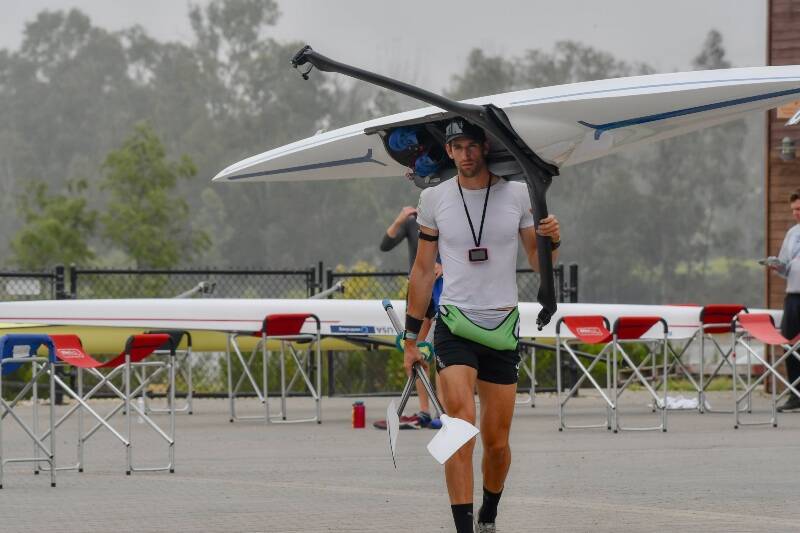The country of Chile is longer than the continental United States is wide, and this long, skinny country will host the quadrennial Pan American Games later this year.
From April 15 to 20, a Qualification Regatta was held on the San Pedro de la Paz course near Concepción, Chile, a storied city dating to its founding in 1550. Located about halfway from the Peruvian border in the north and the tip of Tierra del Fuego in the south, the area is prone to significant earthquakes. Not only, then, it is immersed in history, but it is also a modern city, having been reconstructed several times in the last century.
Jacob Plihal, a graduate of Vashon’s junior rowing program, rowed in two categories at the qualification regatta, or the men’s single and quadruple sculls, and qualified for the Pan American games in both events, which will be hosted in October again at the same venue.
Then, in an “iron man” feat, Plihal returned to Lake Otay in Chula Vista, California, near the Mexican border south of San Diego to win the men’s singles event nine days later in the National Selection Regatta. His victory will send him to the World Cup 2 races in Varese, Italy, from June 16 to 18.
Plihal found Concepción a contrast of social environments.
“Out of the very nice hotel we stayed in, if you walked four blocks in one direction you found yourself in a park with extraordinary athletic facilities. Six blocks the other way you encountered a large vehicle roundabout with a homeless tent encampment and horses staked out in its interior,” he said.
The qualification was supposed to be in March, but it was pushed into April due to delays in getting the course prepared. That put the Pan Am qualifier perilously close to the U.S. National Selection Regatta and caused some U.S. team rowers to not make the trip to Chile.
Plihal won his heat with a rower from Uruguay, coming in second and thus advanced directly to the semi-final two days later, where he placed second to a competitor from Brazil. It is not important to win the semi-final, but it is important to place well in order to get an interior lane in the final.
With such positioning, a rower has good visual contact with competitors on either side. In the final, his Brazilian competitor led the field with a strong push off the start, with Plihal behind the pack until about the 1000-meter mark, or halfway. From there, Plihal moved up to second place but was still more than a boat length back.
With 250 meters to go, Plihal brought his stroke rate up to about 38 — quite high for someone as tall as him — and powered through to the win by over a boat length.
“The South Americans are known for their jackrabbit starts. I stayed patient and my strategy was to overtake them at the end of the race when they were spent,” he said.
The strategy paid off. In the quad, the U.S. boat moved through the race sequence and got sixth place in the final. Normally, only the top five boats from the qualifier move through to the games in the fall, but since Chile was in the final and has an automatic seat at the full games, the U.S. boat will get an invitation for the full games in October.
Meanwhile, about 5,600 miles northwest in Chula Vista, California, preparations were being finalized for the National Selection Regatta (NSR). Unfortunately, in addition to his grueling travel schedule, Plihal also picked up a cold and did not enter the NSR in top form.
The event started with a time trial that served to seed racers for the two semi-finals. Plihal placed fifth out of 10 entrants in the time trial and nineteen seconds back of the top finisher.
“I just needed to survive those first two races while I recovered my energy,” he said, finishing second in his semi-final to qualify for the final.
For his last of nine races in nine days, which Plihal led from start to finish, he won the NSR in the single by over a boat length. He will now continue cross-training on the bike, lifting weights and rowing at the training center in Chula Vista until it is time to travel to World Cup 2 in Italy in June. Placing in the top 6 at World Cup 2 will ensure a spot in the 2023 World Championships to be held in Beograd, Serbia in September.
From there, the top nine finishers will be assured a place in the Paris Olympics in July 2024.
To support the U.S. National Rowing Team, visit usrowing.org.



